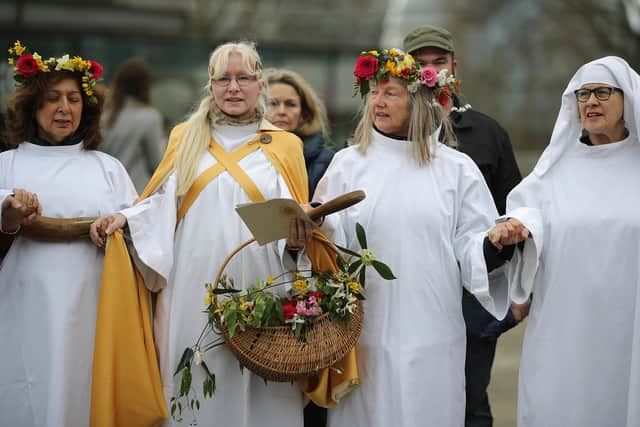When is spring 2024? Spring equinox date and time, start, first day in UK - when do the clocks go forward?
and live on Freeview channel 276
This week sees the annual spring equinox roll around once again, for many the 'official' start of the season.
As the days get warmer and the nights get longer - not to mention the flowers sprouting from the greenery - it's a sign that summer truly is on its way, and the cold, bleak days of winter will soon be but a distant memory.
Advertisement
Hide AdAdvertisement
Hide AdBut how exactly does the spring equinox come about? What does it all mean, and is it really the start of spring?! Here is everything you need to know about it.
What is the spring equinox?
The spring equinox occurs when the Sun crosses the celestial equator, resulting in a day and night of approximately equal duration at all latitudes.
Earth orbits the Sun in an elliptical path, while simultaneously rotating on its tilted axis. This axial tilt, approximately 23.5 degrees relative to its orbital plane, is the primary driver behind Earth's changing seasons.
As our planet revolves around the Sun, different regions receive varying amounts of sunlight throughout the year, leading to the familiar cycle of spring, summer, autumn, and winter.
Advertisement
Hide AdAdvertisement
Hide AdDuring the equinoxes, Earth's axis is positioned perpendicular to the Sun's rays, causing the daylight to spread evenly across the Northern and Southern Hemispheres.
The term "equinox" derives its name from the Latin name ‘eqi’, which means ‘equal’, and ‘nox’, which means ‘night’.
When is the spring equinox in 2024?


There are two equinoxes each year, in March and September - both are when the day and night are approximately 12 hours each everywhere on Earth. The spring equinox always occurs around 20 or 21 March in the Northern Hemisphere.
In 2024, the spring equinox falls on Wednesday 20 March. The exact time at which the equinox takes place will change ever so slightly depending on your location in the UK, but for reference, in London it will occur at 3.06am.
What does it mean?
Advertisement
Hide AdAdvertisement
Hide AdSymbolically, the spring equinox represents balance and renewal. It occurs at a time when the tilt of the Earth's axis is neither inclined away from nor towards the Sun, resulting in a state of equilibrium between light and darkness.
This balance is often associated with themes of harmony, growth, and new beginnings, making the spring equinox a symbol of hope and rejuvenation. Culturally, the spring equinox has been celebrated for millennia by various civilisations around the world.
Many cultures view it as a time of transition, marking the end of winter and the beginning of spring. Festivals and rituals held during this time often focus on themes of fertility, rebirth and the awakening of nature from its winter slumber.
In addition, the spring equinox has practical implications for agriculture and traditional knowledge systems.
Advertisement
Hide AdAdvertisement
Hide AdIn agricultural societies, the equinox serves as a guide for planting and harvesting crops, as it signals the arrival of warmer weather and longer daylight hours conducive to agricultural activities.
Is it the start of spring?
For many, the spring equinox denotes the start of spring. However, while this astronomical definition of the arrival of spring is technically correct, it is just one of three potential ways to determine when the season actually begins.
It's important to note that the equinox itself doesn't dictate the onset of spring; rather, it marks a moment of astronomical alignment. The transition to spring is influenced by various factors, including local climate patterns and cultural conventions.
Over the majority of the Northern Hemisphere, meteorological spring officially begins on 1 March, since the spring months are typically defined as March, April, and May.
Advertisement
Hide AdAdvertisement
Hide AdThis is due to the fact that meteorologists typically use average monthly temperatures to split seasons into three-month intervals, with summer being the warmest and winter being the coldest.
But due to our planet's diverse ecosystems, one definition of spring in one location might not suit the definition of the same season in another region. In fact, some cultures don't even have a 'spring' at all!
The four seasons as we know them serve as a reliable indicator of the weather in temperate latitudes, such as the UK, but not in other areas of the world.
For example, there are essentially just two seasons in the polar regions: summer, when the Sun never sets, and winter, when it never rises.
Advertisement
Hide AdAdvertisement
Hide AdIn the tropics, there can be two wet seasons and two dry seasons - both hot - per year, and in the far east, where the weather is dominated by the monsoons, there are three distinct seasons - cool-dry, hot-dry, and hot-wet.
Therefore, since the transition to spring is influenced by various factors, it can be easier to determine its arrival using local climate patterns and cultural conventions.
When do the clocks change?
The spring equinox also holds practical implications for timekeeping and daylight management. In the UK for example, the clocks "spring forward" one hour on the last Sunday in March, shortly after the spring equinox.
This transition to British Summer Time (BST) aligns with the longer daylight hours characteristic of spring and summer months, and by advancing the clocks, society maximises daylight during the evening hours.
In 2024, the clocks will go forward by one hour at 1am in the early hours of Sunday 31 March.
Comment Guidelines
National World encourages reader discussion on our stories. User feedback, insights and back-and-forth exchanges add a rich layer of context to reporting. Please review our Community Guidelines before commenting.
